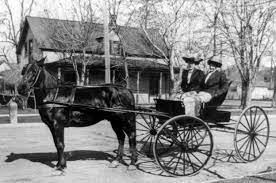
Quaint. That’s the word that comes to mind when reading Elizabeth Bishop’s “Manners,” a poem dedicated to some “child” 101 years ago.
It is especially quaint (and I daresay nostalgic in the most human of ways) to see it through the clouded lens of 2019. A poem about manners? Now, in the Age of Trump and its trickle-down rudeness, selfishness, and vanity?
The speaker’s grandfather, perhaps laughable to more cynical readers, might come across as almost holy to others. Grandpa as prophet, then, and where did we get lost along the way?
See where you fall as a reader. Is it a hopelessly-dated chuckle or a prophetic reminder that there’s still time, and always will be, to go back to being human beings who are part of a shared community—that is, humans who are actually kind and caring?
I hope that question is not rhetorical.
Manners
Elizabeth Bishop
For a child of 1918
My grandfather said to me
as we sat on the wagon seat,
“Be sure to remember to always
speak, to everyone you meet.”
We met a stranger on foot.
My grandfather’s whip tapped his hat.
“Good day, sir. Good day. A fine day.”
And I said it and bowed where I sat.
Then we overtook a boy we knew
with his big pet crow on his shoulder.
“Always offer everyone a ride;
don’t forget that when you get older,”
my grandfather said. So Willy
climbed up with us, but the crow
gave a “Caw!” and flew off I was worried.
How would he know where to go?
But he flew a little way at a time
from fence post to fence post, ahead;
and when Willy whistled he answered.
“A fine bird,” my grandfather said,
“and he’s well brought up. See, he answers
nicely when he’s spoken to.
Man or beast, that’s good manners.
Be sure that you both always do.”
When automobiles went by,
the dust hid the people’s faces,
but we shouted ”Good day! Good day!
Fine day!” at the top of our voices.
When we came to Hustler Hill,
he said that the mare was tired,
so we all got down and walked,
as our good manners required.